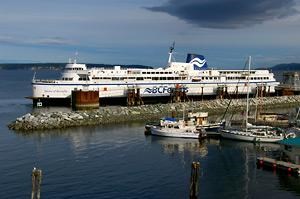Ferry users on minor routes, including those serving Powell River, can expect an average increase in fares of just over eight per cent per year until 2015 unless government subsidies go up or service levels go down.
The latest projections come from the BC Ferry Commission which has released the preliminary decision on price caps for the 2012 to 2015 performance term. The 8.23 per cent determines maximum allowed fare levels that BC Ferries can charge. The figure is based on six-year cost projections, a six-year capital plan, traffic forecasts and other information.
Potentially, this means a near 33 per cent increase in fares for routes serving Powell River by 2016. The figure is lower than the 12 to 14 per cent increase that BC Ferries CEO David Hahn predicted in November and is at the high end of predictions from Northern Sunshine Coast Ferry Advisory Committee chair Bill Cripps. Fares for routes serving Powell River have gone up 64 to 87 per cent in the past seven years.
Powell River-Sunshine Coast MLA Nicholas Simons said ferry-dependent communities like Powell River were deceived by the government in 2003 when it promised stable fares when BC Ferries became a private corporation. Simons has written a letter to Premier Christy Clark asking her to cancel the increases and will be meeting with Blair Lekstrom, new minister of transportation and infrastructure, to discuss the issue.
“These fare increases hurt our economy and hit families hard,” said Simons. “Nobody and nothing is spared from the impact of these increases. How will we attract young people to the coast?”
Lekstrom said during a press conference that he believes the numbers are too high and the government will look at options to minimize the impact. Lekstrom said the main challenge ahead is to determine how to keep service levels somewhere near where they currently sit while maintaining affordable rates. He said he’s relieved to see that numbers are not as high as Hahn predicted but recognizes they are still a significant increase.
“It can’t continue, it’s very clear to me,” said Lekstrom. “The public that use these [services] on a day-to-day basis, they can’t sustain those kind of increases. We’re going to look at what we can do and we’re going to do everything within our ability to find efficiencies and look at all of our options.”
Lekstrom couldn’t yet say whether the government would increase the subsidy to BC Ferries but said that all options are being considered and the concerns of ferry users are being heard. In regard to executive compensation, Lekstrom said that that issue has been dealt with and the numbers would not make the difference. He praised BC Ferries for its good work and said the numbers that have been provided make sense, even if too high for his liking.
The commission’s report now goes to the government where a decision will be made on the level of funding for the performance term. The commission has also asked government to consider a number of changes to service levels that were proposed last year, none of which would affect Powell River other than a generic request for “increased flexibility” for all routes.
BC Ferries has one month to respond to the commission’s report if it finds its conclusions to be unreasonable. Members of the public have the opportunity to give their input into the decision and to proposed service level changes until June 30 and can do so at the commission's website. The commission’s final decision on price caps must be issued on September 30.



